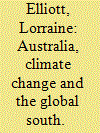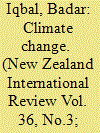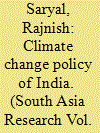|
|
|
Sort Order |
|
|
|
Items / Page
|
|
|
|
|
|
|
| Srl | Item |
| 1 |
ID:
108149


|
|
|
|
|
| Publication |
2011.
|
| Summary/Abstract |
Australia's climate change relationship with developing countries is framed by the 1992 United Nations Framework Convention on Climate Change and the 1997 Kyoto Protocol. Under those agreements, Australia has committed to take a lead in cutting greenhouse gas emissions and to provide technological and financial support to developing countries. In practice, Australian governments of both political hues have adopted a somewhat ambiguous and ambivalent attitude to developing countries within climate change politics and their fulfilment of those commitments has been uneven. This is particularly so if the concept of the 'Global South' is expanded from developing countries to include those people who are vulnerable to the environmental, social and economic impacts of climate change.
|
|
|
|
|
|
|
|
|
|
|
|
|
|
|
|
| 2 |
ID:
171078


|
|
|
|
|
| Summary/Abstract |
International public administrations (IPA s) play a significant role for the success of multilateral negotiations. As the bureaucratic bodies of international organizations, they are deeply involved in international negotiations, but receive little credit for their outcomes. By studying the administrative styles of the Secretariat of the UN Framework Convention on Climate Change (UNFCCC), this article arrives at an understanding of how this IPA aims at contributing to the outcome of multilateral climate change negotiations. Administrative styles can be conceived of, ideal typically, as being entrepreneurial or servant-like. The article observes that, despite a prohibitively strict mandate as a technocratic facilitator, the UNFCCC Secretariat adopts an entrepreneurial style at the policy initiation stage and a cautiously entrepreneurial style during the policy formulation phase. It has acquired a distinctive actor quality in the climate regime, motivated by a strong commitment to furthering meaningful cooperation and driving the UNFCCC process toward ambitious climate policies.
|
|
|
|
|
|
|
|
|
|
|
|
|
|
|
|
| 3 |
ID:
104791


|
|
|
| 4 |
ID:
157483


|
|
|
|
|
| Summary/Abstract |
Since the 1970s, and especially following the 1992 Rio Earth Summit, climate change has become an area of high politics, engaging the whole world at the international and diplomatic level. What matters, though, is how this translates into tangible policies at national and local levels, and how these different scales interact. Highlighting India’s unique position in international climate negotiations, this article first scrutinises various official statements and documents of the Government of India (GOI) on climate change and puts them into an analytical framework that demonstrates continuities, but also significant recent shifts. Investigating the reasons for such modifying trends and examining their consequences, the article then suggests that partly owing to recent changes in global and (geo)political contexts, but also due to an Indian re-thinking of responsibility for addressing global climate change, there is a significant new development. This seems to augur a South Asian ‘silent revolution’ in green technologies, a prudent, economically and ecologically beneficial step, not only for India but possibly a sustainable global model.
|
|
|
|
|
|
|
|
|
|
|
|
|
|
|
|
| 5 |
ID:
184596


|
|
|
|
|
| Summary/Abstract |
The 26th United Nations Climate Change Conference or COP26 was held in Glasgow, Scotland, between 31 October and 12 November 2021. Convened under the presidency of the United Kingdom, the conference had as its main aim the acceleration of action towards achieving the goals of the 2015 Paris Agreement and the UN Framework Convention on Climate Change. Following two weeks of intense negotiations, the Glasgow Climate Pact was adopted. Reflecting a delicate balance, it stresses the urgency of enhancing ambition and action in relation to mitigation, adaptation and finance to address the gaps in the achievement of these goals.
|
|
|
|
|
|
|
|
|
|
|
|
|
|
|
|
|
|
|
|
|